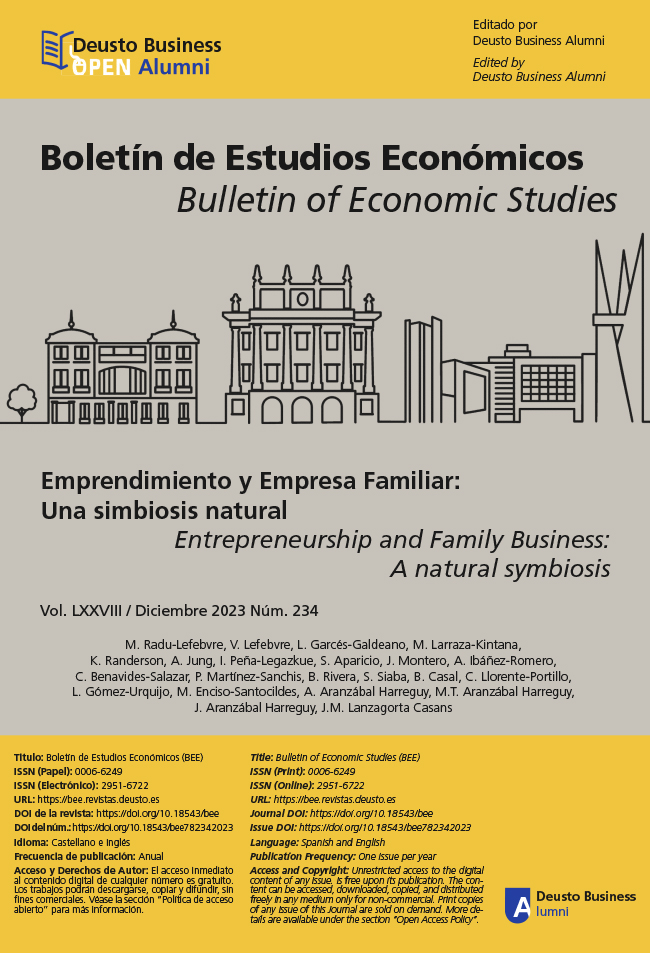Cuestiones para reflexionar: emprendimiento familiar en cuatro preguntas
Resumen
El emprendimiento familiar es un campo de estudio en crecimiento. El propósito de este ensayo es transmitir el impulso a académicos, profesionales y la sociedad. El ensayo se estructura en torno a cuatro preguntas que invitan a la reflexión: ¿quién es la familia?, ¿qué papel juegan los valores?, ¿qué es el espíritu empresarial? y ¿por qué la situación de la familia empresaria y la empresa familiar es tan complicada? Estas preguntas y los elementos de respuesta ofrecidos conducen a una comprensión más amplia y profunda del Emprendimiento Familiar a nivel individual, familiar y empresarial familiar. Las contribuciones a la teoría son dobles. En primer lugar, este ensayo subraya la necesidad de una comprensión y acción contextualizadas y proporciona marcos para llevarlas a cabo. En segundo lugar, arroja luz sobre los daños ocasionados al centrarse en la corriente principal y las generalizaciones al desentrañar aspectos importantes hasta ahora ignorados. Las contribuciones a la práctica se refieren a una comprensión más amplia y profunda del Emprendimiento Familiar, reconociendo y apoyando comportamientos adaptados a la situación como emprendedores, y ampliando los resultados identificados de estos comportamientos. Las contribuciones a la sociedad están vinculadas al predominio de las familias empresarias y las empresas familiares en las economías y sociedades de todo el mundo. Usando este peso para el impacto social, el Emprendimiento Familiar puede ser un faro para la transición hacia economías y sociedades más colaborativas, justas y sobrias.
Recibido: 26 de abril de 2023
Aceptado: 05 de octubre de 2023
Citas
Aldrich, H. E., & Cliff, J. E. (2003). The pervasive effects of family on entrepreneurship: toward a family embeddedness perspective. Journal of Business Venturing, 18(5), 573–596. https://doi.org/10.1016/s0883-9026(03)00011-9
Andreini, D., Bettinelli, C., Foss, N.J,. & Mismetti, M. (2021), Business model innovation: a review of the process-based literature. Journal of Management and Governance, 26(4), 1089-1121. https://doi.org/10.1007/s10997-021-09590-w
Astrachan, J.H., & Shanker, M.C. (2003). Family businesses’ contribution to the US economy: a closer look. Family Business Review, 16(3), 211-219.
Barrédy, C. (2016). In search of future alternatives for family business: family law contributions through civil and common law comparison. Futures, 75, 44–53. https://doi.org/10.1016/j.futures.2015.09.005
Bergamaschi, M., & Randerson, K. (2016). The futures of family businesses and the development of corporate social responsibility. Futures, 75, 54-65. https://doi.org/10.1016/j.futures.2015.10.006
Bettinelli, C., Sciascia, S., Randerson, K., & Fayolle, A. (2017). Researching entrepreneurship in family firms. Journal of Small Business Management, 55(4), 506-529. https://doi.org/10.1111/jsbm.12347
Bettinelli, C., Fayolle, A., & Randerson, K. (2014). Family entrepreneurship: a developing field. Foundations and Trends® in Entrepreneurship, 10(3), 161-236. Now publishers. https://doi.org/10.1561/0300000049
Brannon, D. L., Wiklund, J., & Haynie, J. M. (2013). The varying effects of family relationships in entrepreneurial teams. Entrepreneurship Theory and Practice, 37(1), 107–132. https://doi.org/10.1111/j.1540-6520.2012.00533.x
Brundin, E., & Härtel, C.E.J. (2014) Emotions in family firms. In: Melin L, Nordqvist M and Sharma P (eds). The Sage Handbook of Family Business. London: Sage, 529–548.
Chua, J. H., Chrisman, J. J., & Sharma, P. (1999). Defining the family business by behavior. Entrepreneurship theory and practice, 23(4), 19-39. https://doi.org/10.1177/104225879902300402
Clauß, T., Kraus, S., & Jones, P. (2022). Sustainability in family business: mechanisms, technologies and business models for achieving economic prosperity, environmental quality and social equity. Technological Forecasting and Social Change, 176, 121450. https://doi.org/10.1016/j.techfore.2021.121450
Clinton, E., McAdam, M., Brophy, X., & Gamble, J. (2021). Entrepreneurial learning: The transmitting and embedding of entrepreneurial behaviours within the transgenerational entrepreneurial family. Entrepreneurship & Regional Development, 33(5-6), 383–404. https://doi.org/10.1080/08985626.2020.1727088
Coontz, S. (2016). The way we never were: American families and the nostalgia trap. Hachette UK.
Discua Cruz, A., E. Hamilton., & Jack. (2021). Understanding entrepreneurial opportunities through metaphors: A narrative approach to theorizing family entrepreneurship. Entrepreneurship & Regional Development, 33(5-6), 405–426. https://doi.org/10.1080/08985626.2020.1727089
Dibrell, C., & Memili, E. (2019). A brief history and a look to the future of family business heterogeneity: An introduction. In The Palgrave handbook of heterogeneity among family firms, 1-15. Palgrave Macmillan, Cham. https://doi.org/10.1007/978-3-319-77676-7_1
Dou, J., Su, E., Li, S., & Holt, D. (2020). Transgenerational entrepreneurship in business families: what is explicitly learned and what is successfully transferred? In Families in Business, 92-106. Routledge. https://doi.org/10.1080/08985626.2020.1727090
e Cunha, M. P., Leitão, M. J. S., Clegg, S., Hernández-Linares, R., Moasa, H., Randerson, K., & Rego, A. (2021). Cognition, emotion and action: persistent sources of parent–offspring paradoxes in the family business. Journal of Family Business Management.
Estrada-Robles, M., Williams, N., & Vorley, T. (2021). Structural coupling in entrepreneurial families: how business-related resources contribute to enterpriseness. Entrepreneurship & Regional Development, 1(5-6), 457–474. https://doi.org/10.1080/08985626.2020.1727093
Frank, H., Lueger, M., Nosé, L., & Suchy, D. (2010). The concept of “Familiness”: Literature review and systems theory-based reflections. Journal of Family Business Strategy, 1(3), 119–130. https://doi.org/10.1016/j.jfbs.2010.08.001
Frank, H., Kessler, A., Rusch, T., Suess–Reyes, J., & Weismeier–Sammer, D. (2017). Capturing the familiness of family businesses: Development of the family influence familiness scale (FIFS). Entrepreneurship Theory and Practice. 41(5), 709–742. rhttps://doi.org/10.1111/etap.12229
Goldscheider, F. K. (2000). Men, children and the future of the family in the third millennium. Futures, 32(6), 525–538. https://doi.org/10.1016/s0016-3287(00)00005-7
Gómez-Mejía, L. R., Haynes, K. T., Núñez-Nickel, M., Jacobson, K. J., & Moyano-Fuentes, J. (2007). Socioemotional wealth and business risks in family-controlled firms: Evidence from Spanish olive oil mills. Administrative science quarterly, 52(1), 106–137. https://doi.org/10.2189/asqu.52.1.106
Habbershon, T. G., & Williams, M. (1999). A resource-based framework for assessing the strategic advantages of family firms. Family business review, 12(1), 1–25. https://doi.org/10.1111/j.1741-6248.1999.00001.x
Habbershon, T.G., Williams, M., & MacMillan, I. (2003). A unified systems perspective of family firm performance. Journal of business venturing, 18(4), 451–465.
Hanson, S., & Keplinger, K. (2021). The balance that sustains Benedictines: Family entrepreneurship across generations. Entrepreneurship & Regional Development, 33(5-6), 442–456. https://doi.org/10.1080/08985626.2020.1727092
Kidwell, R. E., Kellermanns, F. W., & Eddleston, K. A. (2012). Harmony, justice, confusion, and conflict in family firms: Implications for ethical climate and the “fredo effect”. Journal of business ethics, 106, 503-517. https://doi.org/10.1007/s10551-011-1014-7
Koerner, A. F., & Fitzpatrick, M. A. (2002). Toward a theory of family communication. Communication Theory, 12(1), 70–91. https://doi.org/10.1111/j.1468-2885.2002.tb00260.x
Koerner, A. F., & Fitzpatrick, M. A. (2004). Communication in intact families. In A. Vangelisti (Ed.), Handbook of family communication, (pp. 177–195). Mahwah, NJ: Lawrence Erlbaum. https://doi.org/10.4324/9780203848166.ch8
Labaki, R., & D’Allura, G. M. (2021). A governance approach of emotion in family business: Towards a multi-level integrated framework and research agenda. Entrepreneurship Research Journal, 11(3), 119-158. https://doi.org/10.1515/erj-2021-2089
Montgomery, A. (2008). US Families 2025: in search of future families. Futures, 40(4), 377–387. https://doi.org/10.1016/j.futures.2007.08.005
Michael-Tsabari, N., Labaki, R., & Zachary, R. K. (2014). Toward the cluster model: The family firm’s entrepreneurial behavior over generations. Family Business Review, 27(2), 161-185. https://doi.org/10.1177/0894486514525803
Nordqvist, M., & Melin, L. (2010). Entrepreneurial families and family firms. Entrepreneurship & Regional Development, 22(3-4), 211-239. https://doi.org/10.1080/08985621003726119
Parrique, T. (2022). Ralentir ou périr: l’économie de la décroissance. Seuil.
Pieper, T. M., Kellermanns, F. W., & Astrachan, J. H. (2021). Update 2021: Family Businesses’ Contribution to the US Economy. Family Enterprise USA, Washington, DC, (704).
Radu-Lefebvre, M., & Randerson, K. (2020). Successfully navigating the paradox of control and autonomy in succession: The role of managing ambivalent emotions. International Small Business Journal, 38(3), 184-210. https://doi.org/10.1177/0266242619879078
Ramirez-Pasillas, M., Brundin, E., & Markowska, M. (2017). Contextualizing Entrepreneurship in Emerging Economies and Developing Countries. Edward Elgar, Cheltenham. https://doi.org/10.4337/9781785367533.00006
Randerson, K. (2016). Entrepreneurial Orientation: do we actually know as much as we think we do?. Entrepreneurship & Regional Development, 28(7-8), 580-600. https://doi.org/10.1080/08985626.2016.1221230
Randerson, K. (2022). Conceptualizing family business social responsibility. Technological Forecasting and Social Change, 174, 121225. https://doi.org/10.1016/j.techfore.2021.121225
Randerson, K. (2023a). The futures of business schools: Identity, strategies, and imagined futures for a pandemic/post-pandemic world. Futures, 150, 103175. https://doi.org/10.1016/j.futures.2023.103175
Randerson, K. (2023b). Family entrepreneurship: A perspective article. Journal of Family Business Management, forthcoming. https://doi.org/10.1108/jfbm-07-2023-0109
Randerson, K. (2023b). Entrepreneurship and families: Family entrepreneurship. Elgar Encyclopedia of Family Business, ed. Discua Cruz & Howorth, forthcoming.
Randerson, K., Bettinelli, C., Dossena, G., & Fayolle, A. (Eds.). (2015). Family Entrepreneurship: Rethinking the research agenda. Routledge. https://doi.org/10.4324/9781315732381
Randerson, K., & Estrada-Robles, M. (2023). Beyond the nexus family–business: introducing the family business service ecosystem. International Journal of Entrepreneurial Behavior & Research, 29(3), 783-798. https://doi.org/10.1108/ijebr-05-2022-0453
Randerson, K., & Fayolle, A. (2021). Family Entrepreneurship Education: Where Are We? Where Do We Need to Go from Here?. Family Entrepreneurship: Insights from Leading Experts on Successful Multi-Generational Entrepreneurial Families, 183-196. https://doi.org/10.1007/978-3-030-66846-4_14
Randerson, K., Bettinelli, C., Fayolle, A., & Anderson, A. (2015a). Family entrepreneurship as a field of research: Exploring its contours and contents. Journal of Family Business Strategy, 6(3), 143-154. https://doi.org/10.1016/j.jfbs.2015.08.002
Randerson, K., Dossena, G., & Fayolle, A. (2016). The futures of family business: family entrepreneurship. Futures, 75, 36–43. https://doi.org/10.1016/j.futures.2015.10.008
Randerson, K., Frank, H., Dibrell, C., & Memili, E. (2021). From family to families: pushing family entrepreneurship forward. Entrepreneurship & Regional Development, 33(5-6), 369-382. https://doi.org/10.1080/08985626.2020.1727091
Randerson, K., Seaman, C., Daspit, J. J., & Barrédy, C. (2020). Institutional influences on entrepreneurial behaviours in the family entrepreneurship context: towards an integrative framework. International Journal of Entrepreneurial Behavior & Research, 26(1), 1–13. https://doi.org/10.1108/ijebr-01-2020-824
Randerson, K., & Radu-Lefebvre, M. (2021). Managing Ambivalent Emotions in Family Businesses: Governance Mechanisms for the Family, Business, and Ownership Systems. Entrepreneurship Research Journal, 11(3), 159-176. https://doi.org/10.1515/erj-2020-0274
Raworth, K. (2017). Doughnut economics: seven ways to think like a 21st-century economist. Chelsea Green Publishing. https://doi.org/10.33568/rbs.2409
Rogoff, E. G., & Heck, R. K. Z. (2003). Evolving research in entrepreneurship and family business: Recognizing family as the oxygen that feeds the fire of entrepreneurship. Journal of business venturing, 18(5), 559-566. https://doi.org/10.1016/s0883-9026(03)00009-0
Seaman, C., Bent, R., & Unis, A. (2016). Family entrepreneurship culture, entrepreneurial intent, futures and foresight in Scottish Pakistani communities. Futures, 75, 83-91. https://doi.org/10.1016/j.futures.2015.09.006
Tagiuri, R., & Davis, J. (1996). Bivalent attributes of the family firm. Family Business Review, 9(2), 199–208. https://doi.org/10.1111/j.1741-6248.1996.00199.x
Welter, F. (2011), Contextualizing entrepreneurship – conceptual challenges and ways forward. Entrepreneurship Theory and Practice, 35(1), 165-184. https://doi.org/10.1111/j.1540-6520.2010.00427.x
Yu, A., Lumpkin, G., Sorenson, R. L., & Brigham, K. H. (2012). The landscape of family business outcomes: A summary and numerical taxonomy of dependent variables. Family Business Review, 25(1), 33–57. https://doi.org/10.1177/0894486511430329
Zahra, S. A., & Sharma, P. (2004). Family Business Research: A Strategic Reflection. Family Business Review, 17(4), 331–346. https://doi.org/10.1111/j.1741-6248.2004.00022.x
Licencia:
Los trabajos publicados en esta revista desde 2021 se encuentran disponibles bajo la licencia Creative Commons Attribution-NonCommercial 4.0 International - CC BY-NC 4.0. La actual política de acceso abierto de la revista no se aplica a los contenidos previos 2021.
Derechos de los autores/as:
Los autores y las autoras conservan los derechos de autor/a sobre sus trabajos publicados en el Boletín de Estudios Económicos y conceden a éste derechos no exclusivos para la explotación de los trabajos con fines de maquetación, publicación y difusión. Esta licencia permite al Boletín de Estudios Económicos distribuir, reproducir y difundir los trabajos en su plataforma y otros medios, siempre bajo las condiciones descritas en este aviso.
Derechos de los lectores/as:
Los lectores y las lectoras pueden leer, descargar, imprimir, buscar, compartir (copiar, redistribuir o enlazar textos completos), o adaptar (remezclar, transformar y construir a partir del material) el contenido, siempre que:
- No se utilicen los materiales con fines comerciales.
- Se cite adecuadamente el trabajo original, incluyendo el nombre de la persona autora y la fuente.
- Se indique claramente cualquier modificación realizada al contenido original.
El uso comercial de los materiales está prohibido sin el permiso expreso de las personas autoras. Para mayor claridad, se considera uso comercial cualquier actividad que tenga como fin la obtención de beneficios económicos o que implique un intercambio comercial directo.
Condiciones de uso:
El uso del contenido no debe infringir los derechos de otras personas, ni debe ser utilizado de manera que pueda dañar la reputación del/la autor/a o del Boletín de Estudios Económicos.
Responsabilidad por el contenido:
Los/las autores/as son responsables del contenido de sus trabajos y el Boletín de Estudios Económicos no se hace responsable de las opiniones expresadas en los mismos.
Más información:
Política de Acceso Abierto, Licencia y Derechos de Autor/a


.jpg)
.jpg)
.jpg)







